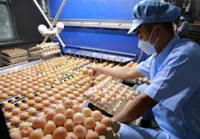A CRACK of thunder booms as dozens of screens in a locked office flash between live video of cars splashing through wet roads, drains sapping the streets dry, and reservoirs collecting the precious rainwater across the tropical island of Singapore.
A team of government employees intently monitors the water, which will be collected and purified for use by the country’s six million residents.
“We make use of real-time data to manage the storm water,” Harry Seah, deputy chief executive of operations at PUB, Singapore’s National Water Agency, says with a smile while standing in front of the screens. “All of this water will go to the marina and reservoirs.”
The room is part of Singapore’s cutting-edge water management system that combines technology, diplomacy and community involvement to help one of the most water-stressed nations in the world secure its water future.
The country’s innovations have attracted the attention of other water-scarce nations seeking solutions.
A small city-state island located in South-East Asia, Singapore is one of the most densely populated countries on the planet. In recent decades the island has also transformed into a modern international business hub, with a rapidly developing economy.
The boom has caused the country’s water consumption to increase by over 12 times since the nation’s independence from Malaysia in 1965, and the economy is only expected to keep growing.
With no natural water resources, the country has relied on importing water from neighbouring Malaysia via a series of deals allowing inexpensive purchase of water drawn from the country’s Johor River. But the deal is set to expire in 2061, with uncertainty over its renewal.
For years, Malaysian politicians have targeted the water deal, sparking political tensions with Singapore.
The Malaysian government has claimed the price at which Singapore purchases water – set decades ago – is too low and should be renegotiated, while the Singaporean government argues its treatment and resale of the water to Malaysia is done at a generous price.
And climate change, which brings increased intense weather, rising seas and a rise in average temperatures, is expected to exacerbate water insecurity, according to research done by the Singaporean government.
“For us, water is not an inexhaustible gift of nature. It is a strategic and scarce resource,” Singapore Prime Minister Lee Hsien Loong said at the opening of a water treatment facility in 2021.
“We are always pushing the limits of our water resources. And producing each additional drop of water gets harder and harder, and more and more expensive.”
Seeking solutions to its water stresses, the Singaporean government has spent decades developing a master plan focusing on what they call their four “national taps”: water catchment, recycling, desalination and imports.
Across the island, 17 reservoirs catch and store rainwater, which is treated through a series of chemical coagulation, rapid gravity filtration and disinfection.
Five desalination plants, which produce drinking water by pushing seawater through membranes to remove dissolved salts and minerals, operate across the island, creating millions of gallons of clean water every day. — AP








































